When Guardians of the Galaxy came out to massive critical and box office success, it showed the world that Marvel apparently could do no wrong. An incredibly obscure property, Guardians is a story about a group of miscreants coming together to become something more, and be a part of something bigger than themselves. This group includes an 80s pop culture referencing man-child, a green skinned assassin, a psychopathic fighter who’s dubbed “The Destroyer”, a weapon loving, talking raccoon, and a giant walking tree that can only say what his name is. Marvel put director James Gunn at the helm, who was known for writing the live-action Scooby Doo film and its sequel, a horror film called Slither, and the Lollipop Chainsaw video game. Guardians of the Galaxy is the most bizarre, colorful, hilarious franchise to come from Marvel Studios, and it’s something that shouldn’t have worked, considering how out there the idea and characters are. James Gunn basically created a new genre.
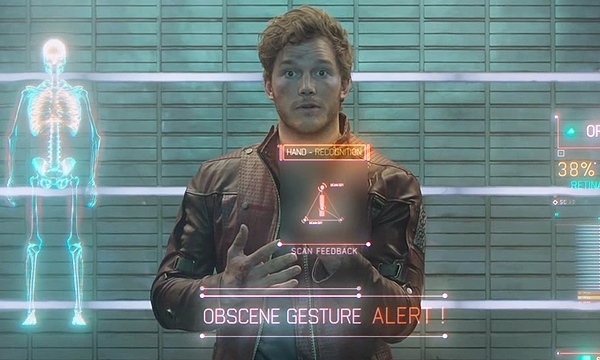
Peter Quill is a man who’s refused to grow
up. Kidnapped from Earth as a child in the 80s, Quill’s emotional maturity was permanently stunted. He refuses to take his dying mother’s hand in her final moments, unable to accept her passing and let go. He’s never been able to grow beyond this moment in his life, and years later still lives life on his own, with no regard or compassion for others. Quill cannot bring himself to get attached to anyone out of fear of losing them as he lost his mother, and not taking her hand remains his biggest regret. This is the film that launched Chris Pratt’s current career, going from playing lovable, dimwitted dolts straight to leading-man action hero, and it’s impressive how easily he slipped into it.
Gamora is the daughter of Thanos, the MCU’s main baddie, and we’re told the mad titan isn’t exactly the best father. She and her sister Nebula have been tortured and forced to fight and kill for as long as they can remember. Drax is a warrior who was forced to watch his wife and daughter murdered in front of him, and who will do anything to get revenge. Rocket is the result of genetic experiments, and is the only one of his kind. He has no family or friends apart from Groot, who’s gentle giant persona is the only thing keeping Rocket in check. He is incredibly offended whenever someone talks down to him or assumes that he’s of a lesser species, which is almost everyone.
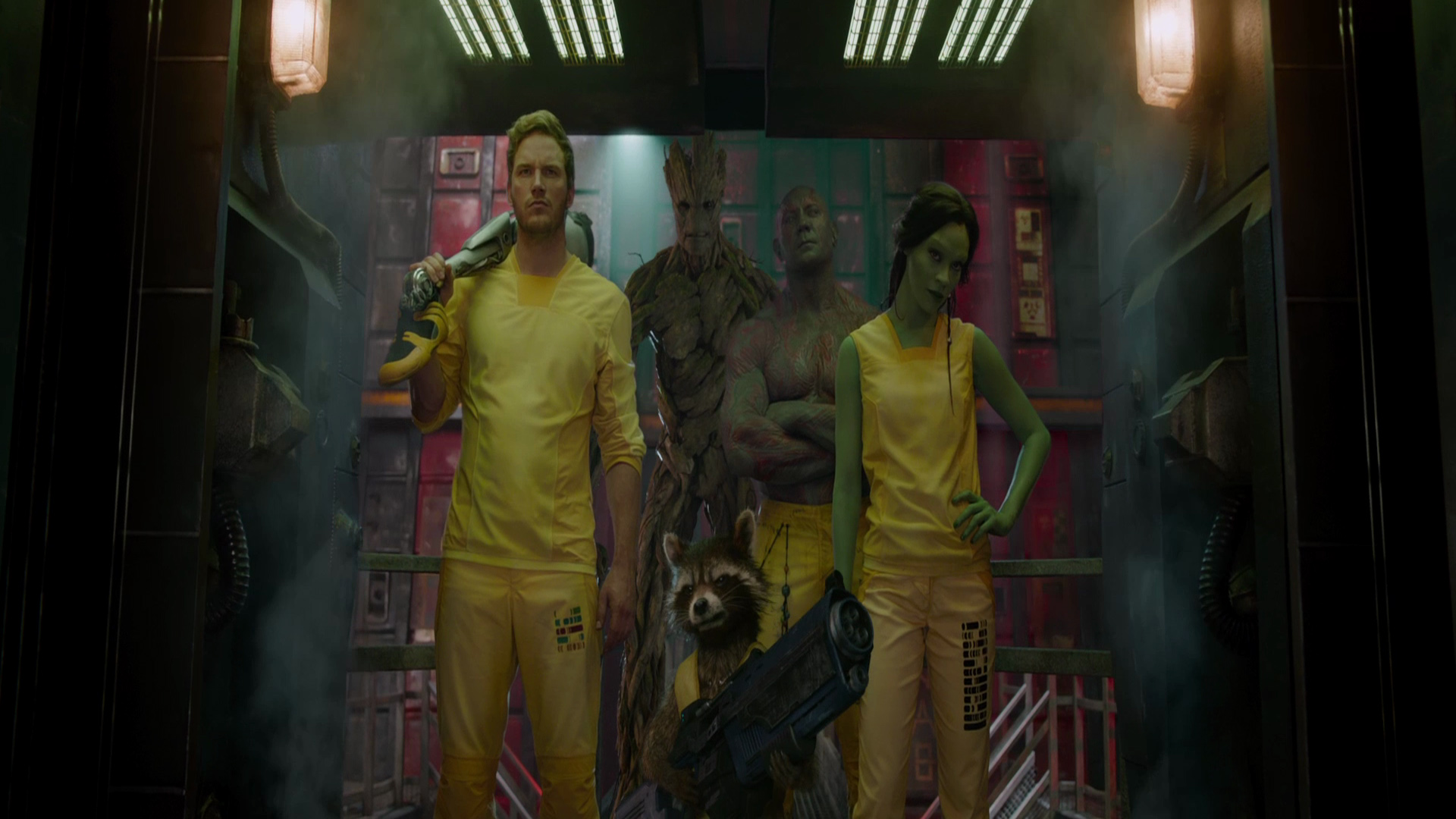
All of these characters are broken, damaged people, and that is the root of this film. These hurt individuals come to find comfort and safety amongst each other, and all of them act as support for one another. For them, this is the only group of people that they can even remotely relate to and get along with, and even then they remain loud, boisterous, and hostile, continuously yelling and badgering each other. All of them are selfish and self-serving, only looking out for themselves. It’s only fitting that the first time they work together is so they can break out of prison. Drax and Rocket constantly toss disrespect at each other to deflect from their pain and sadness, and Peter and Gamora, both robbed of their childhoods and innocence, find romance in each other but lack the emotional stability and social skills to act upon it.
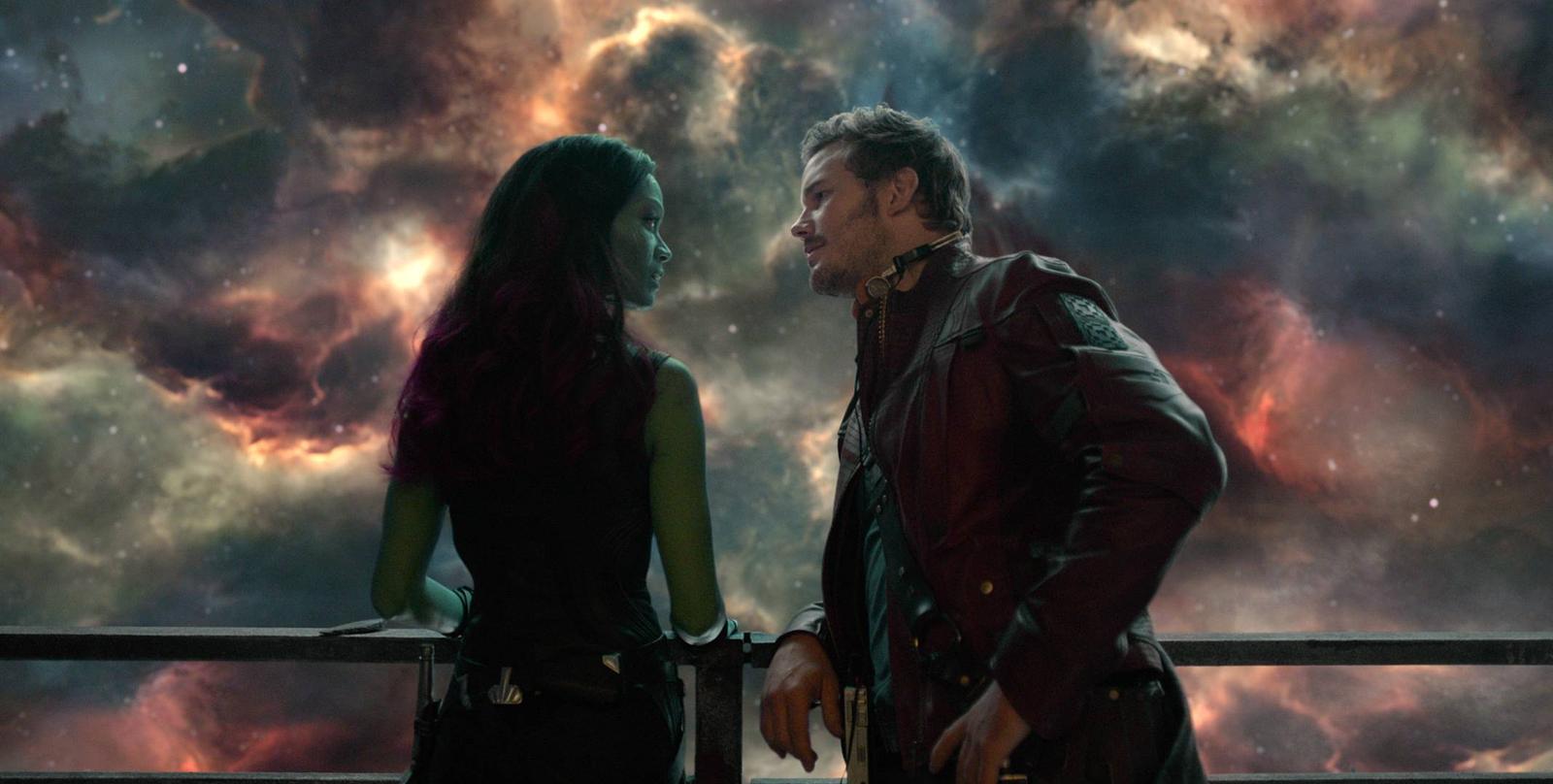
Peter and Gamora’s relationship is a unique one. Peter, ever the womanizer, has no problem making it clear to Gamora that he’s physically attracted to her through his “pelvic sorcery”, as she calls it. What he struggles with are his actual strong feelings for her, his care for her, and his emotional connection to her. When she fails to be the straightforward one about these feelings between them, he becomes frustrated and lashes out. Gamora, forever an untrusting survivor, tries to fight her feelings for Peter, unable to understand them. She constantly goes back and forth between longing flirtation and threatening to kill him. The two may not seem like it, but they are meant for each other. Gamora loves to hear Peter’s stories about his life on Earth as a child and all of the different shows and movies he loves, and Peter loves to have someone to tell them to. These two hold each other up and heal each other’s wounds as they spend time together. Both victims of emotional trauma, they see in each other a chance at happiness, an opportunity for something they thought was unobtainable to them. Peter’s sacrifice to save Gamora in the middle of the film, as he gives her his helmet so she can breathe in space, is a defining moment for his character. He finally found someone he truly cares for, and is willing to give up his own life at a chance for her to live.
They’re all brought together by something much larger than any of them, Ronan the Accuser has an Infinity Stone and is waging a holy war against the planet of Xandar, intent on committing mass genocide. The Guardians, similar to The Avengers, have to put their differences aside and band together to make a difference. “Why would you want to save the galaxy?” “Because I’m one of the idiots who lives in it!”
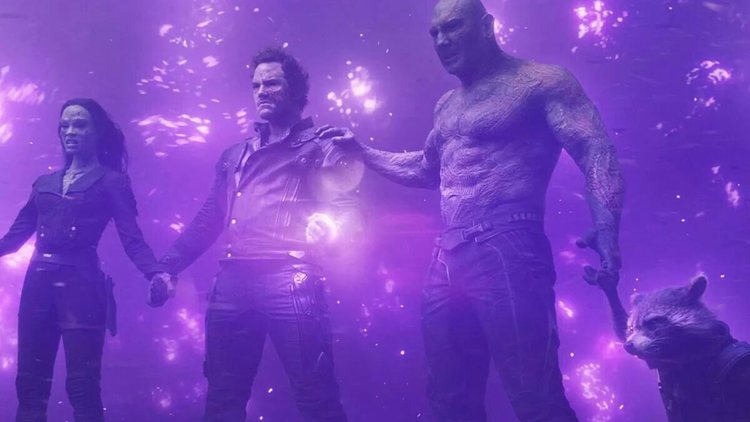
This message of unity against all odds and the joining of broken people from all different walks of life plays throughout the film. Quill’s adoptive father, Yondu, and his rogue gang of Ravagers join the fight as well. Normally only looking out for themselves and not afraid to get their hands dirty (they’re more or less space pirates), Yondu is a classic antihero with a rough exterior but a soft interior, bring his men to Xander to protect Peter and stop Ronan. Xandar’s fleet comes together, their ships linking up to form a giant barrier against Ronan. The villain is defeated not by pure physical confrontation, but by our heroes literally joining hands and standing firm. As Gamora shouts at Peter to take her hand, he sees the image of his mother asking the same. None of this is very subtle, but Guardians of the Galaxy isn’t exactly known for its subtlety.
It’s impressive how James Gunn is able to juggle every character and ensure that each are given enough time and moments, and this is without the benefit of having solo films beforehand, like The Avengers did. The need to introduce everyone and their backstories, as well as explain the galaxy this all takes place in, unavoidably results in the dialogue being a little exposition-heavy, but never to the point of it being too much. Ronan unfortunately joins the lower tier of Marvel villains, lacking anything particularly interesting regarding his character and having no personal relationship with any of the Guardians. However, Lee Pace’s grandiose performance does give the villain some real gravitas at the least.
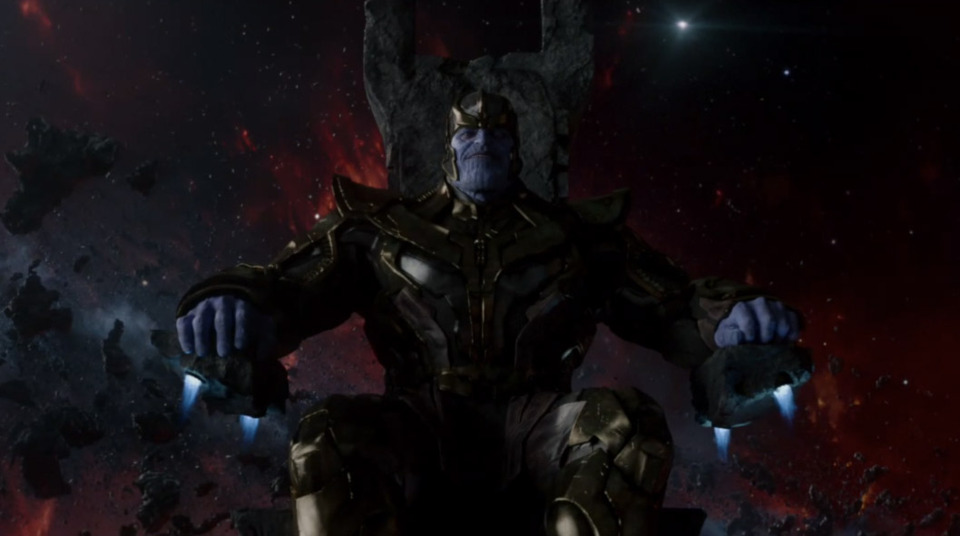
If there’s any evidence of studio meddling in this film like the rest of Marvel’s Phase 2, it’s in the presence of Thanos. Thanos sends Ronan to get The Orb for him, an artifact containing the Power Stone, one of the six Infinity Stones Thanos has been trying to collect. Ronan does so but refuses to hand it over, using the power of the stone for himself to achieve his own goals, and denounces Thanos to his face, claiming that he is now stronger than him. Thanos, someone who earlier threatened to “Bathe the starways in blood”, apparently does nothing in response to this, as we never see him again. His presence in this film seems to serve no real purpose other than to remind audiences that Thanos exists and will be someone to deal with later, and it’s awkwardly placed in a film that doesn’t rely on any other Marvel properties and stands in its own. Thanos isn’t even a part of the sequel, but that’s probably for the better.
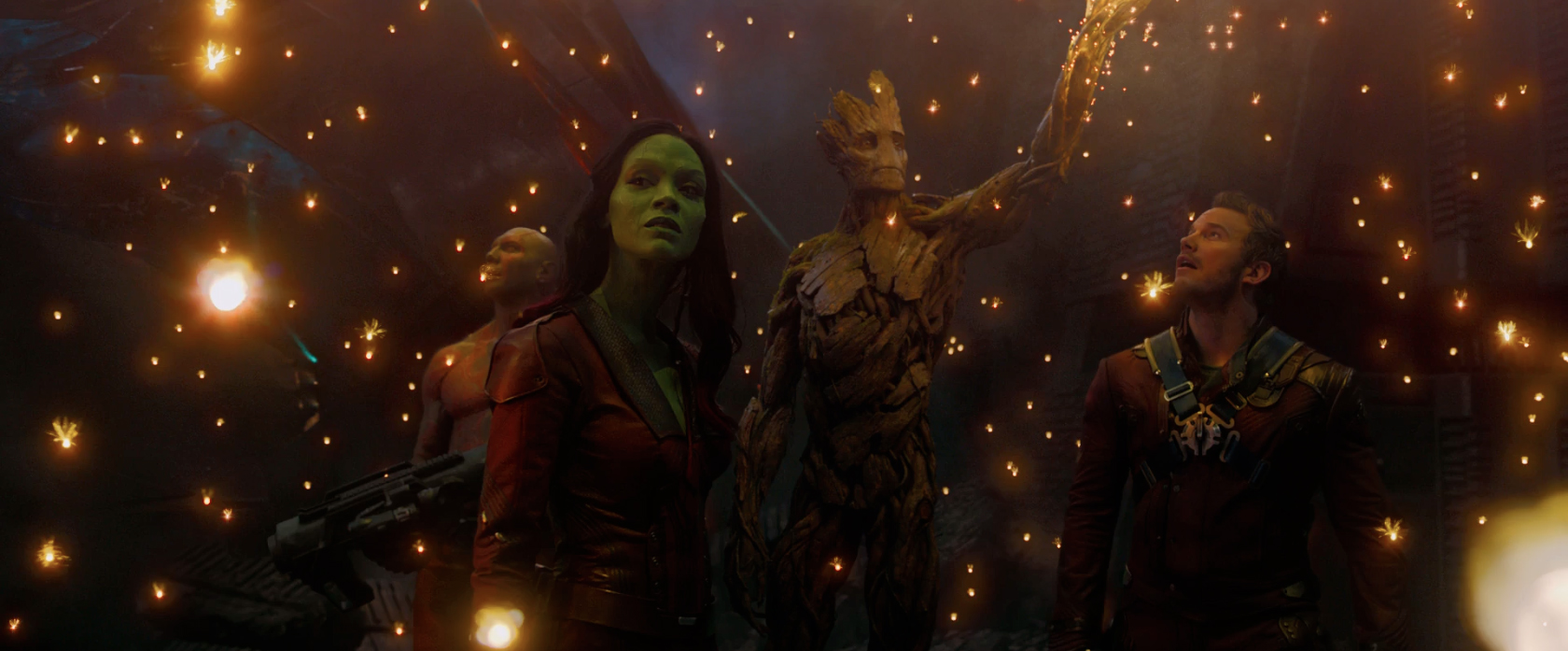
Guardians of the Galaxy became a genre in itself, with a rocking 80s soundtrack blasting throughout the film, gorgeous cinematography that showcases the zany color palette, large-scale space opera action, and genuinely hilarious comedy throughout. It’s an absolute riot from start to finish. Unlike The Avengers, the Guardians of the Galaxy are fundamentally dysfunctional, they’re not especially good people, and are, in fact, “a bunch of a-holes”. But this is what makes them real and relatable. They’re truly unlikely heroes, and because of them, Marvel’s wackiest and silliest film somehow became the most heartfelt and human. Not bad for the writer of Scooby-Doo 2: Monsters Unleashed.
Connections to the MCU: We get our first extended look at Thanos and The Collector finally gives a full explanation as to what the Infinity Stones are.




